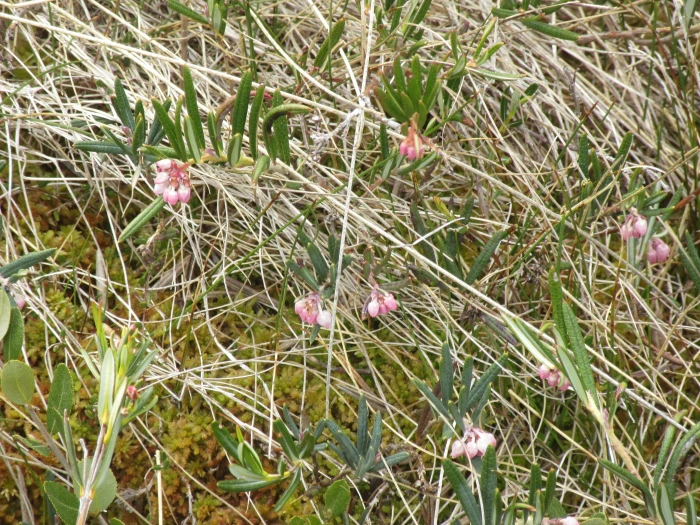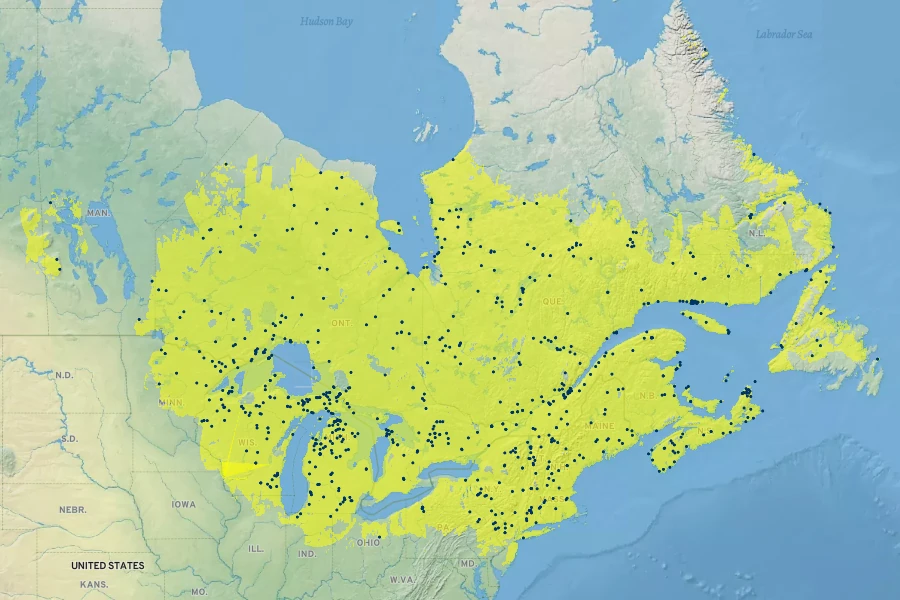Bog Rosemary
/
(Andromeda glaucophylla)
Bog Rosemary (Andromeda glaucophylla)
/

alicia penney
CC BY 4.0
Image By:
alicia penney
Recorded By:
Copyright:
CC BY 4.0
Copyright Notice:
Photo by: alicia penney | License Type: CC BY 4.0 | License URL: http://creativecommons.org/licenses/by/4.0/ | Rights Holder: alicia penney | Publisher: iNaturalist | Date Created: 2018-06-16T15:04:18-07:00 |













































Summary
Andromeda glaucophylla, commonly known as Bog Rosemary, is an evergreen subshrub native to acidic, sphagnum peat bogs, and wetlands in the Northeastern USA and Eastern Canada. It typically grows to a height of 1-2 feet (0.3-0.6 meters) and a width of 1-4 feet (0.3-1.2 meters). This plant has a compact, rounded form with narrow, leathery, blue-green leaves that resemble the leaves of culinary rosemary, hence its common name. From late spring to early summer, Bog Rosemary produces clusters of small, bell-shaped flowers that are white to pale pink, adding a delicate touch to the garden.
Bog Rosemary is valued for its unique foliage and attractive flowers, as well as its ability to thrive in wet, acidic soils where other plants may struggle. It is often used in bog gardens, water features, and as an accent in acidic soil beds. In cultivation, it requires consistent moisture and prefers full sun to partial shade, though it can tolerate more shade in hotter climates. It is essential to plant Bog Rosemary in acidic, peat-rich soil with good drainage to mimic its natural boggy habitat. While generally low-maintenance, it can be susceptible to leaf spot and root rot if conditions are too wet or if soil is not acidic enough. It is not known for aggressive roots or significant disease problems, but it can suffer in dry or alkaline soils.CC BY-SA 4.0
Bog Rosemary is valued for its unique foliage and attractive flowers, as well as its ability to thrive in wet, acidic soils where other plants may struggle. It is often used in bog gardens, water features, and as an accent in acidic soil beds. In cultivation, it requires consistent moisture and prefers full sun to partial shade, though it can tolerate more shade in hotter climates. It is essential to plant Bog Rosemary in acidic, peat-rich soil with good drainage to mimic its natural boggy habitat. While generally low-maintenance, it can be susceptible to leaf spot and root rot if conditions are too wet or if soil is not acidic enough. It is not known for aggressive roots or significant disease problems, but it can suffer in dry or alkaline soils.CC BY-SA 4.0
Plant Description
- Plant Type: Shrub
- Height: 1-2 feet
- Width: 1-4 feet
- Growth Rate: Slow
- Flower Color: White, Pink
- Flowering Season: Spring
- Leaf Retention: Evergreen
Growth Requirements
- Sun: Full Sun, Part Shade
- Drainage: Medium
Common Uses
Bee Garden, Edible*Disclaimer: Easyscape's listed plant edibility is for informational use. Always verify the safety and proper identification of any plant before consumption., Low Maintenance, Water Garden
Natural Habitat
Acidic, sphagnum peat bogs, and wetlands
Other Names
Common Names:
Scientific Names: Andromeda polifolia var. glaucophylla, Andromeda polifolia subsp. glaucophylla, Andromeda glaucophylla, Andromeda glaucophylla var. iodandra, Andromeda polifolia var. concolor, Andromeda glaucophylla var. glaucophylla, Andromeda glaucphylla, Andromeda polifolia f. concolor
GBIF Accepted Name: Andromeda polifolia var. glaucophylla (Link) DC.
